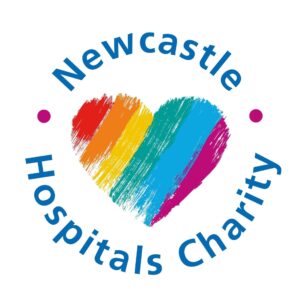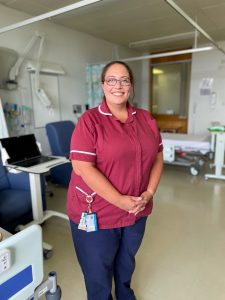One of Newcastle’s first NMAHP Researcher Development Institute Fellows, Sarah Hogg will carry out a Masters in Research Fellowship with the support of the Trust’s NMAHP Research Team.
Sarah’s Fellowship aims to determine the acceptability and feasibility of motivational interviewing for patients with alcohol related liver disease, providing support and strategies to emphasise how reducing their alcohol intake could be of great benefit.

The Fellowship has been made possible thanks to Newcastle’s RDI funding backed by the Newcastle Hospitals Charity, which will enable Sarah to carry out three years of study alongside her clinical role 50:50 with half of her clinical role backfilled.
Deputy Chief Nurse Ian Joy said: “A key priority for our NMAHP Strategy is increasing research opportunities and impact, whilst strengthening academic links.
“Sarah’s successful Researcher Development Institute Fellowship is a fantastic example of our commitment to ensuring that our staff can autonomously engage in, lead and translate research and I have no doubt that Sarah will do just that, bringing about positive impact for the patients she involves in her research.”
Committed to making a positive impact for patients with alcohol related liver disease
Sarah has been a Hepatology Research Nurse for six years, following seven years as a ward nurse, and another seven years in intensive care.
During that latter period of her nursing career Sarah saw many patients who were critically ill as a result of severe alcohol related illness, some of whom sadly died.
In fact, evidence shows that alcohol misuse is the biggest risk factor for death, ill health and disability among 15-49 year olds in the UK and the fifth biggest risk factor across all ages.
Alcohol also contributes to approximately 60 other conditions such as colon and breast cancer.

“We know that hospital admissions due to alcohol misuse across the UK are highest in the North East of England which is also representative of the lower socioeconomic population in this area,” explains Sarah.
“Once admitted to hospital prognosis is frequently poor.
“Not only that but patients with alcohol related liver disease and cirrhosis can suffer with many complications such as ascites, hepatic encephalopathy, oesophageal varices which often require the patients to be admitted to hospital.”
Sarah wanted to make a positive impact for these patients by moving into research specialising in liver disease. It wasn’t long before she could see the potential for introducing new approaches to supporting this group of patients.
Sarah explains: “When I first started in research there was a large study underway which recruited a lot of patients with alcohol-related liver disease. I enjoyed spending time with them and they enjoyed talking to us about their history.
“They told me about their different reasons for drinking, whether it was during emotionally or physically difficult times or that they just didn’t realise they were drinking more than the recommended units.”
Cognitive Behavioural Therapy
Sarah continues “I was completing a Cognitive Behavioural Therapy module for my degree at Northumbria University at the time and heard how respiratory nursing colleagues had improved their patients’ quality of life, and that their work had reduced hospital admissions.
“I began to think about how we could use a similar approach to improve the quality of life for our patients with liver disease as well as helping to reduce their long term morbidity and mortality.”
At present, patients are encouraged to reduce or stop drinking alcohol and are offered a referral to community addiction services or to ask their GP for a referral. Sarah says that when patients walk out of clinic they either feel motivated and encouraged to seek further help, or experience feelings of denial.
She says: “The aim of my study would be to see patients before they leave hospital to support them and reinforce how reducing their alcohol intake may benefit them. We would try to find out reasons why they are drinking and find alternative strategies to reduce or avoid alcohol consumption.
“I would also be able to sign post patients to addiction services that would benefit their personal needs and preferences such as online, ‘Apps’ or Face to face . This would be followed up with a weekly phone call to discuss any issues and offer ongoing encouragement and support.”
In Newcastle Hospitals, there are Substance Misuse Nurses who offer support to patients admitted with decompensations. Sarah’s study would hopefully prevent some of these admissions and also link up primary and secondary care.
Every Contact Counts
The Royal College of Nursing recognises that Every Contact Counts. The aim of Sarah’s study would be to have contact with cirrhotic patients before they suffer with any liver decompensations and encourage them to reduce and eventually stop drinking. This would benefit their quality of life, reduce risk of morbidity and mortality, and be of benefit to their relatives and the wider NHS.
“Newcastle University provides a Motivational Interviewing Course,” explains Sarah “which I would like to complete before the end of the year to ensure that the patients are receiving the most effective care.
“I really hope that this research reaches marginalised patients in the community to help improve their quality of life. The work involves caring for and being kind to the patients and their relatives. We are trying to develop new methods of care and by using research to develop evidence based effective treatments to improve the health and wellbeing of patients with alcohol related liver disease.”
Of her successful bid for Newcastle’s first NMAHP RDI Fellowships, Gareth Davies, Senior Research Nurse and team lead for hepatology, HPB surgery and respiratory research said:
“I would like to start by congratulating Sarah on being awarded this fantastic fellowship. It is brilliant to see Sarah, who has been delivering research for other clinicians developing her own ideas and pursuing the chance to lead her own research in an area she is passionate about.
“The research that Sarah is planning has the power to make a real difference in the lives of many patients. I am excited to observe the outcomes of her research following this internship and watching it change practice to the benefit of patients and their families.”
Could you be one of our next NMAHP RDI Fellows?
If you would like to find out more about becoming one of our NMAHP RDI Fellows, you can go to our Researcher Development Institute webpage.
Watch our NMAHP RDI video
Our animation explains how Newcastle’s NMAHP Researcher Development Institute programme works across the four seasons of the year.
Contact us
Email the NMAHPs Research Team at [email protected]
